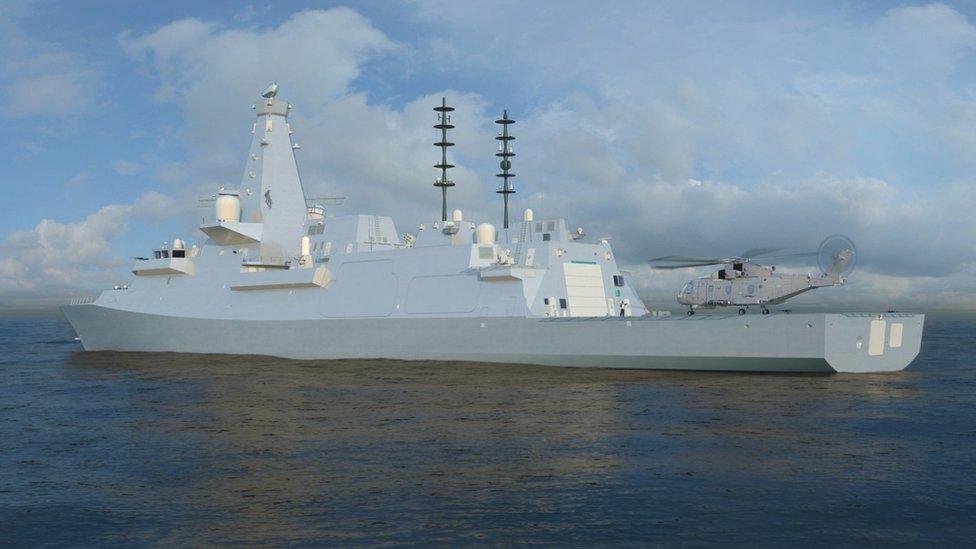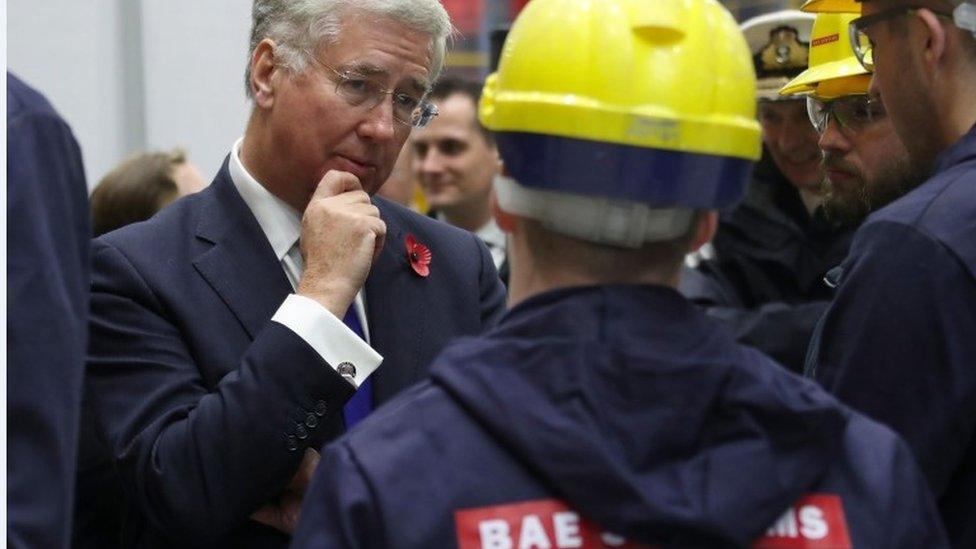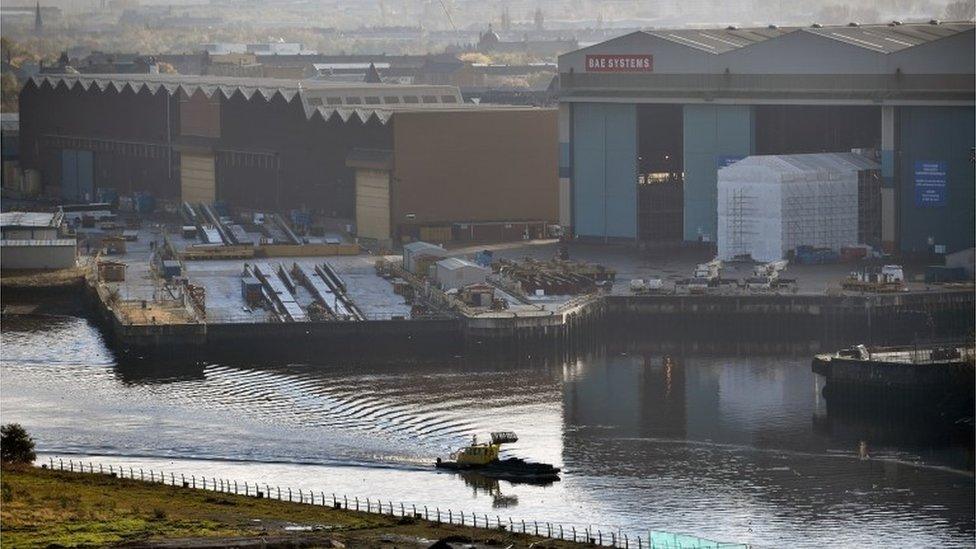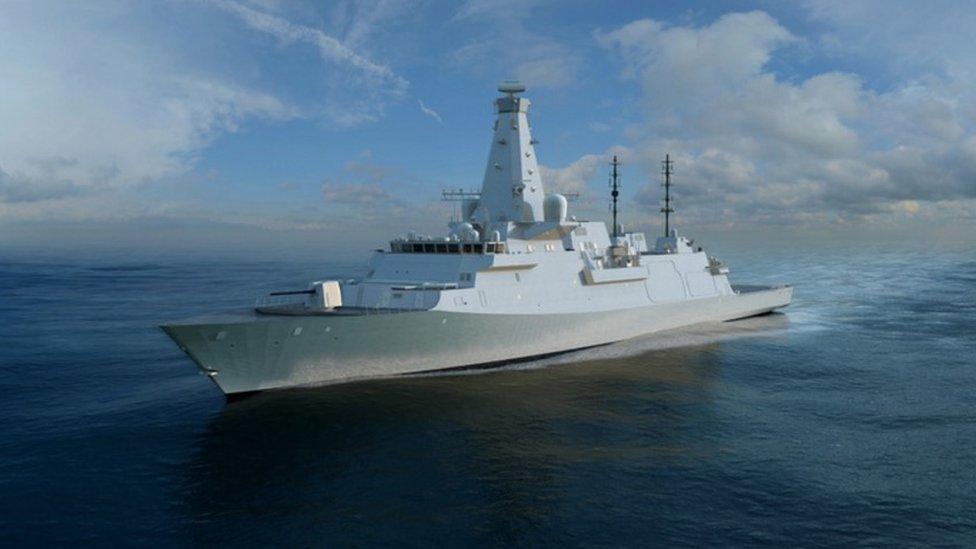Sounding out the Senior Service
- Published

Eight complex frigates will be built, known as the Type 26
Not many firms can offer a job guarantee for at least 19 years. But BAE Systems on the Clyde isn't just any firm. It's the monopoly supplier of complex warships to the Royal Navy.
So when Defence Secretary Michael Fallon arrives in Govan one Friday morning in November, bringing good news about shipyard orders, he's spending big, and long term.
Eight complex frigates will be built, known as the Type 26. He's committing to orders for some of the equipment they will need.
He's talking about the announcement "securing hundreds of jobs, and hundreds more jobs in the supply chain".
But perhaps he's under-selling all this a tad. The yards currently have around 2,700 workers. And a recent study by economists at the Fraser of Allander Institute concluded that it supports 4,900 workers. Surely this announcement is securing thousands of jobs?
Cutting steel
Or is it? There's quite a lot in this announcement that's not clear. Here are some of the things Mr Fallon is not saying...
The contract between the Ministry of Defence and BAE Systems hasn't yet been signed. There are details to be finalised. The announcement has been about an "agreement in principle". The price tag is being left very vague.
We were led to believe such an announcement on cutting steel (the ceremonial around laying down the first part of a hull) would only follow conclusion of such a deal. In the media, we've been put on alert for such an announcement over recent months, only to be stood down.
To keep the yards busy-ish until the Type 26 work can start and then ramp up, there are to be a further two Offshore Patrol Vessels built, in addition to the three which have been under construction since the aircraft carriers were floated off to Rosyth in Fife.
But those contracts aren't finalised either, and won't be until at least next month.

Defence Secretary Michael Fallon was in Govan to announce the shipyard orders
Mr Fallon is not committing to build the other five replacements for ageing frigates. The Type 31 is in a very early stage of development. It should be lighter, cheaper, perhaps faster and not specialised, as the Type 26 will be, in anti-submarine warfare.
Even if the Ministry of Defence does place orders for those five, it's not committing to do so at the Clyde yards. It is in "pole position," we're told. That's a long way from the end of the contract tendering race, and a long way from a guarantee.
And a hint was dropped about building modules of each future ship in different places. That is how the carriers have been built and assembled in Fife, but that was because they are so big. It makes less sense in building a frigate.
That is despite the most recent defence review concluding that all complex warship building should, in future, be on the Clyde, at the twinned Govan and Scotstoun yards. That is why they shut down the shipyard in Portsmouth, to rationalise capacity for the longer-term, with these new frigates in mind.

All 13 replacement frigates were to be Clyde-built, we were told. But now, er, not so much. A new National Shipbuilding Strategy was ordered in spring, led by industrialist Sir John Parker. It is due for publication around the time of the autumn statement, which is only three weeks away.
I'd watch out for some potentially unpalatable messages; about the Clyde having a monopoly on Royal Navy shipbuilding capacity while Scottish independence remains a live issue: and about the question of whether the Royal Navy has to commit to its complex ships being built in Britain. Other, strategically significant defence equipment doesn't get that level of protection.
Oilers
That issue is being raised by trade unions, who are pointing to the question mark now over the Rosyth dockyard capacity in Fife, where the aircraft carriers are currently being assembled, but where the "drumbeat" of work doesn't look like it has much of a future. They want to see Royal Fleet Auxiliary ships built in Scotland and reckon the Scottish workforce could be put to work on them.
But the Ministry of Defence put the last support ship contract out to tender internationally, and they're currently being built in South Korea for £450m. The 'oilers' or replenishment ships for ship-to-ship fuel supplies should have been delivered in spring this year, and in service by the end of next month, with three more following at six-monthly intervals.
By summer, the first of them, Tidespring, was delayed in sea trials. It's now running around eight months behind schedule.
But the Ministry of Defence is confident that all four ships will be deployed by 2018, and that the cost of that delay is being met by the Koreans. Take note: BAE Systems.
- Published4 November 2016
